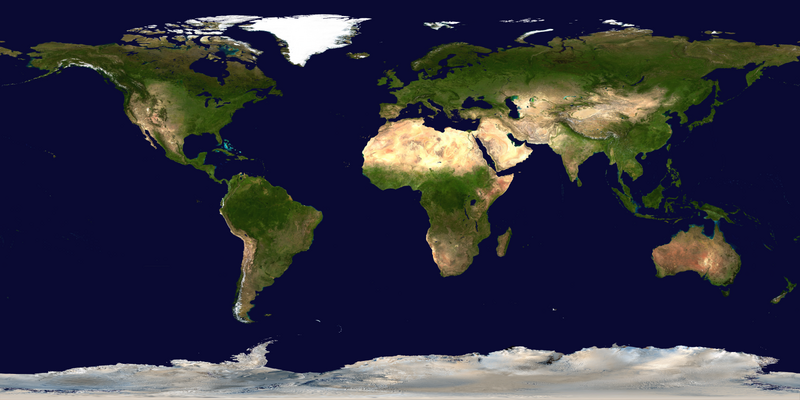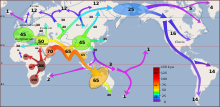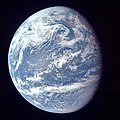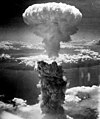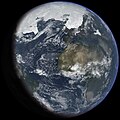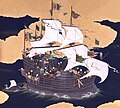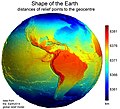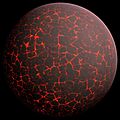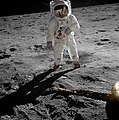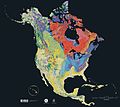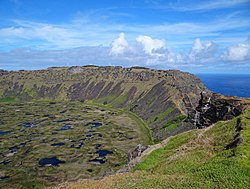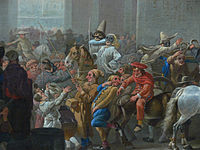Portal:World
The World Portal

The world is the totality of entities, the whole of reality, or everything that exists. The nature of the world has been conceptualized differently in different fields. Some conceptions see the world as unique while others talk of a "plurality of worlds". Some treat the world as one simple object while others analyze the world as a complex made up of parts.
In scientific cosmology, the world or universe is commonly defined as "[t]he totality of all space and time; all that is, has been, and will be". Theories of modality talk of possible worlds as complete and consistent ways how things could have been. Phenomenology, starting from the horizon of co-given objects present in the periphery of every experience, defines the world as the biggest horizon or the "horizon of all horizons". In philosophy of mind, the world is contrasted with the mind as that which is represented by the mind. Theology conceptualizes the world in relation to God, for example, as God's creation, as identical to God or as the two being interdependent. In religions, there is a tendency to downgrade the material or sensory world in favor of a spiritual world to be sought through religious practice. A comprehensive representation of the world and our place in it, as is found in religions, is known as a worldview. Cosmogony is the field that studies the origin or creation of the world while eschatology refers to the science or doctrine of the last things or of the end of the world.
In various contexts, the term "world" takes a more restricted meaning associated, for example, with the Earth and all life on it, with humanity as a whole or with an international or intercontinental scope. In this sense, world history refers to the history of humanity as a whole and world politics is the discipline of political science studying issues that transcend nations and continents. Other examples include terms such as "world religion", "world language", "world government", "world war", "world population", "world economy", or "world championship". (Full article...)
Selected articles -
General images -
Megacities of the world -
Lagos (/ˈleɪɡɒs/ LAY-goss; also US: /ˈlɑːɡoʊs/ LAH-gohss; Yoruba: Èkó) or Lagos City is the most populous city in Nigeria, with an estimated population of 21 million in 2015. Lagos is the most populous urban area in Africa. Lagos was the national capital of Nigeria until December 1991 following the government's decision to move their capital to Abuja in the centre of the country. Lagos is a major African financial centre and is the economic hub of Lagos State and Nigeria at large. The city has a significant influence on commerce, entertainment, technology, education, politics, tourism, art, and fashion in Africa. Lagos is also among the top ten of the world's fastest-growing cities and urban areas. The megacity has the fourth-highest GDP in Africa and houses one of the largest and busiest seaports on the continent. Due to the large urban population and port traffic volumes, Lagos is classified as a Medium-Port Megacity.
Lagos emerged as a home to the Awori subgroup of the Yoruba of West Africa islands, which are contained in the present day Local Government Areas (LGAs) of Lagos Island, Eti-Osa, Amuwo-Odofin and Apapa. The islands are separated by creeks, fringing the southwest mouth of Lagos Lagoon, while being protected from the Atlantic Ocean by barrier islands and long sand spits such as Bar Beach, which stretch up to 100 km (62 mi) east and west of the mouth. Due to rapid urbanisation, the city expanded to the west of the lagoon to include areas in the present day Lagos Mainland, Ajeromi-Ifelodun, and Surulere. This led to the classification of Lagos into two main areas: the Island, which was the original city of Lagos, and the Mainland, which it has since expanded into. This city area was governed directly by the Federal Government through the Lagos City Council, until the creation of Lagos State in 1967, which led to the splitting of Lagos city into the present-day seven Local Government Areas (LGAs), and an addition of other towns (which now make up 13 LGAs) from the then Western Region to form the state. (Full article...)Did you know -

- ... that Aly Tewfik Shousha, a founding member of the World Health Organization, died while attending the WHO executive meeting in Geneva?
- ... that Tonic Immobility's "pure, undiluted chaos" is "an escape from the realities of the world"?
- ... that the bones of Dante were to be taken to Mussolini's intended last stand against the Allies at the Valtellina Redoubt?
- ... that so little is known about the reclusive developer of Yume Nikki that its publisher Kadokawa Games had to debunk rumors that they had died in the 2011 Tōhoku earthquake?
- ... that Howard Mayers is credited with the destruction of at least eleven enemy aircraft during World War II?
- ... that when visiting Britain during World War II, naval officer Kalyani Sen reported that Indian women were breaking down prejudices against men and women working together by joining the military?
- ... that Corky Palmer coached the Southern Miss Golden Eagles to their only College World Series appearance in 2009?
- ... that researchers used Google Earth to study mysterious Neolithic structures in the volcanic fields of Harrat Khaybar?
Countries of the world -

The United States of America (USA or U.S.A.), commonly known as the United States (US or U.S.) or America, is a country primarily located in North America. It is a federation of 50 states, a federal capital district (Washington, D.C.), and 326 Indian reservations. Outside the union of states, it asserts sovereignty over five major unincorporated island territories and various uninhabited islands. The country has the world's third-largest land area, second-largest exclusive economic zone, and third-largest population, exceeding 334 million.
Paleo-Indians migrated across the Bering land bridge more than 12,000 years ago. British colonization led to the first settlement of the Thirteen Colonies in Virginia in 1607. Clashes with the British Crown over taxation and political representation sparked the American Revolution, with the Second Continental Congress formally declaring independence on July 4, 1776. Following its victory in the Revolutionary War (1775–1783), the country continued to expand across North America. As more states were admitted, sectional division over slavery led to the secession of the Confederate States of America, which fought the remaining states of the Union during the 1861–1865 American Civil War. With the Union's victory and preservation, slavery was abolished nationally. By 1890, the United States had established itself as a great power. After Japan's attack on Pearl Harbor in December 1941, the U.S. entered World War II. The aftermath of the war left the U.S. and the Soviet Union as the world's two superpowers and led to the Cold War, during which both countries engaged in a struggle for ideological dominance and international influence. Following the Soviet Union's collapse and the end of the Cold War in 1991, the U.S. emerged as the world's sole superpower. (Full article...)
The Seven Wonders of the Ancient World, also known as the Seven Wonders of the World or simply the Seven Wonders, is a list of seven notable structures present during classical antiquity. The first known list of seven wonders dates back to the 2nd–1st century BC.
While the entries have varied over the centuries, the seven traditional wonders are the Great Pyramid of Giza, the Colossus of Rhodes, the Lighthouse of Alexandria, the Mausoleum at Halicarnassus, the Temple of Artemis, the Statue of Zeus at Olympia, and the Hanging Gardens of Babylon. Using modern-day countries, two of the wonders were located in Greece, two in Turkey, two in Egypt, and one in Iraq. Of the seven wonders, only the Pyramid of Giza, which is also by far the oldest of the wonders, still remains standing, while the others have been destroyed over the centuries. There is scholarly debate over the exact nature of the Hanging Gardens, and there is doubt as to whether they existed at all. (Full article...)Related portals
Protected areas of the world -
Selected world maps
World records
- List of Olympic records in athletics
- List of world records in athletics
- List of junior world records in athletics
- List of world records in masters athletics
- List of world youth bests in athletics
- List of IPC world records in athletics
- List of world records in canoeing
- List of world records in chess
- List of cycling records
- List of world records in track cycling
- List of world records in finswimming
- List of world records in juggling
- List of world records in rowing
- List of world records in speed skating
- List of world records in swimming
- List of IPC world records in swimming
- List of world records in Olympic weightlifting
Topics
Categories
Wikimedia
The following Wikimedia Foundation sister projects provide more on this subject:
-
Commons
Free media repository -
Wikibooks
Free textbooks and manuals -
Wikidata
Free knowledge base -
Wikinews
Free-content news -
Wikiquote
Collection of quotations -
Wikisource
Free-content library -
Wikispecies
Directory of species -
Wikiversity
Free learning tools -
Wikivoyage
Free travel guide -
Wiktionary
Dictionary and thesaurus

